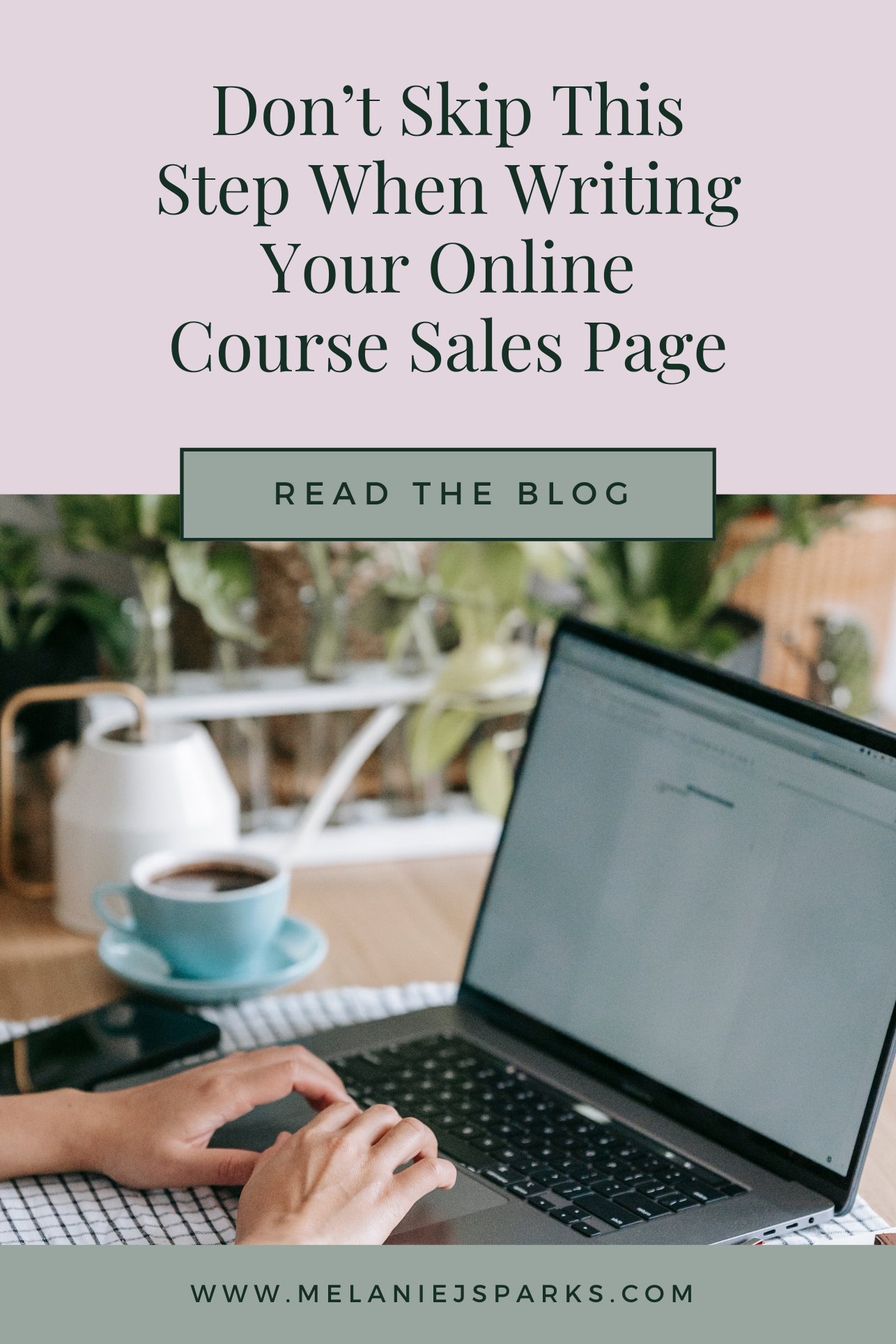Don’t Skip This Step When Writing Your Online Course Sales Page
One of the first questions I ask when someone says their sales page isn’t converting is this:
“Did you do your research before you wrote the copy?”
Based on the awkward silence, I’m guessing a lot of course creators skip this step when writing their sales page. Then they wonder why they didn’t make as many sales as they wanted.
The truth is, if you don't do your research, you’re hurting your sales.
DO YOU REALLY HAVE TO DO RESEARCH BEFORE WRITING CONVERSION COPY?
“Ugg. Sounds complicated. I just want to launch my offer already. Do I really have to do research?”
Short answer: YES. You do have to do research. (Side note: It doesn’t have to be so complicated.)
I get it. Research sounds like a lot of work and trouble.
So, why bother?
The weight of conversion falls heavier on the side of research than it does on the side of the words on your sales page.
It’s what you do BEFORE you wrote a single word of copy that makes the single biggest difference in your conversion rate. Your research/lack of research makes or breaks your copy.
Without RESEARCH, you’re guessing what your audience wants.
You’re guessing how they talk, think, and feel about their problems and desires.
You’re guessing whether or not they’re even willing to solve their problems.
You’re guessing what solutions they’ve already tried and hoe that worked out for them.
You’re guessing what will move them from browser to buyer.
When it comes to conversion copy, the last thing you want to do is guess.
Even if a past version of you was exactly where your ideal client is now, you’re still just guessing if you only rely on what you think.
I repeat: Your sales page copy should not be based on what y-o-u think about what your ideal customer wants. It should be based on what they actually want.
WHAT KIND OF RESEARCH DO YOU NEED TO DO BEFORE WRITING YOUR SALES PAGE?
Dictionary definition of research: Systematic investigation into and study of materials and sources in order to establish facts and reach new conclusions.
Let’s break that down…
What you’re doing is investigating systematically. (If it makes you feel better to call it investigating, please do. I’m a very nosy person, so I love to investigate.) << Yes, you can and should freestyle when doing customer interviews, but you should always have a research system in place.
You need materials and sources to investigate. << Those sources include people. You must have conversations with your ideal buyer before you write the copy.
Your goal is to establish facts and reach new conclusions. << Those facts and conclusions are understanding exactly how your prospect speaks, thinks, feels, and acts when it comes to the problem your offer helps them solve.
So, we’ve established why you need to research and what it really means.
But how? Remember, I said it doesn’t have to be complicated…
HOW TO DO RESEARCH FOR YOUR SALES PAGE COPY
For simplicity’s sake, let’s think of research in two ways:
Conversations (AKA voice of customer research)
Info Mining
Conversations
Of course, having conversations with people who have worked with you, or bought a version of your offer or product in the past is ideal. But even if you haven’t sold a single offer yet, you can do this.
Want to have conversations with ideal customers? Here’s how:
Define your ideal buyer - Be ultra-specific in your request. Don’t waste time by asking to talk to moms aged 20 to 55 who want to start a business. Talk to moms who left their office jobs during COVID to start their own VA business but are struggling to find consistent, quality clients.
Ask to speak with people - Put out a customer research chat request on social media, in groups, to your email list, and send them to your scheduler to book 15- to 30-minute calls.
Choose your questions (4-6) - You want to know how the problem affects their daily life, what solutions they’ve tried and how those worked, what they want and how getting it will/has affect(ed) their life, and how they make buying decisions for your type of offer. << Write questions that will elicit that info.
Have the conversation - Get on a quick video or voice call. Be sure to record it, so you can listen again later. Of course, always ask for their permission to record.
Listen!!! - Number one tip here! Ask a question and really listen to their answer. Unexpected questions will flow from their answers. This is when I get the GOLD for copy — when the convo takes an unexpected turn.
Dig deeper - Don’t be afraid to follow up an answer and ask: Why did you [take that action] or [feel that way]? How did you feel about [that event]? How did it affect you? When you [took this action], what was going through your mind? Can you tell me more about [what you just said]?
Interpret - After your calls, re-read your notes and listen to the recordings. You’re sifting for pain points, emotions, desires, motivations, what they’ve tried, buying objections, misconceptions or limiting beliefs. (Compile and organize this info. This is the raw material for your sales page copy.)
Bottom line: There is no substitute for having a conversation with a potential customer.
Another option is to run a low-price beta version of your course to test it in real-time and get feedback. Always make the customer research call a part of the deal — both before they start and after they complete the program.
Bonus — all of this material can be used for testimonials too.
Info Mining
Info mining is simply combing through existing resources looking for key info to inform your copy.
Find related products, books, courses, testimonials, or offers. You need to be reasonably sure their target audience is similar to yours for this to work.
Where to look:
Your own client/audience feedback on intake forms, surveys, social media, and what they say during any coaching calls
Amazon reviews for books on related topics
Competitor’s websites, sales pages, and social media
Competitor reviews + testimonials
Comments on related social posts, blogs, or YouTube videos
Quora, Reddit, other Q + A on related subjects
Google searches — ask a question and see the questions others are asking
You’re collecting the same types of info as you would in an interview with a past client. Look for their pain points, emotions, desires, motivations, what they’ve tried, their buying objections, misconceptions, and limiting beliefs.
Remember, all of this info you’re collecting is the raw material you’ll use to create your sales copy. So, research isn’t a step to check off your list — it’s an absolute essential.
HEY, I'M MELANIE SPARKS.
I'm a conversion copywriter for digital course creators, experts, and service providers who have hit 6 figures or more and want to scale by staying in their zone of genius.
I help you go from Offer to Empire™ by nailing your offer, messaging, and strategy, then layering on the conversion copy.
Want to know how we can work together? Click here.




